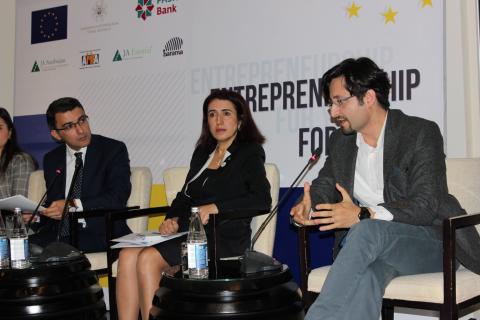
The EU last week launched a youth entrepreneurship project in Azerbaijan, aiming to strengthen capacity building and to ensure greater civil society participation in the development of the entrepreneurial eco-system.
The EU-funded ‘Entrepreneurship for Youth’ aims to promote dialogue among stakeholders and engage local entrepreneurs, business professionals and representatives of CSOs in capacity building, resource development and delivery of entrepreneurship education and financial literacy. The project will be implemented in Baku, Gabala, Gakh, Ganja, Khachmaz, Masally, Mingachevir and Zagatala regions. The action will engage 150 teachers and 3,000 students of pilot vocational and secondary schools.
‘Entrepreneurship for Youth’ will be implemented over four stages in close cooperation with the Ministry of Education. This will include:
- development of high-quality content, teaching resources and tools for delivery of entrepreneurship education and financial literacy based on Junior Achievement programmes;
- capacity building and teacher training;
- piloting/testing (student training) and evaluation;
- preparation of policy briefs and recommendations for integration of entrepreneurship education and financial literacy into the educational curricula through the application of best practices.
The project’s kick-off meeting last week was organised to inform participants about the start of the project, provide an overview of project objectives and activities with stakeholders, and invite them to join the network of stakeholders.Project partners, representatives from government agencies, CSOs, embassies and business sector took part in the meeting, which was also attended by the Deputy Miniser of Education Mrs. Mahabbat Valiyeva, and by Ambassador Kestutis Jankauskas, head of the EU Delegation in Azerbaijan.
The Deputy Minister underlined the importance of introducing financial literacy and entrepreneurial education at secondary schools. Entrepreneurial education, which is the core element of this project, teaches the important skills of innovative and creative thinking, helping youth to develop a flexible “growth mindset”, and includes life skills as well as business skills. In this way, she said, the ‘Entrepreneurship for Youth’ project is aligned with the State Strategy on Education Development.
In his remarks, Ambassador Jankauskas outlined how the project fits with the European Union priorities for cooperation in Azerbaijan, namely ensuring that the education system responds to the needs of the labour market through skills development, thus contributing to economic diversification and job creation. The Ambassador also mentioned the importance of the project in terms of demonstrating the contribution that civil society can bring to socio-economic development of the country, and to bringing together government and private sector.
A panel discussion on the topic of “Entrepreneurship and financial literacy among youth” was organised during the meeting, with presentations by Aynura Piriyeva, head of Corporate Banking and Business Development of Pasha Bank, Jhale Hajiyeva, executive director of AMFA, Imran Baghirov, general manager of BARAMA Innovation and Entrepreneurship Centre and Sevinj Mammadova, executive director of JA Azerbaijan, who all shared their experiences in working with youth and boosting SME development in Azerbaijan.
‘Entrepreneurship for Youth’ is funded by the European Union and implemented by Junior Achievement Azerbaijan in partnership with Junior Achievement Estonia, the Azerbaijan Micro-finance Association (AMFA), Barama Innovation and the Entrepreneurship Centre. It is co-funded by Pasha Bank.
The Azerbaijan Micro-finance Association also implements another project funded by the EU under its EU4Business initiative – Accelerating development of sustainable micro-entrepreneurship in rural regions of Azerbaijan, which targets micro and small-scale rural business entrepreneurs and their families in five rural regions (Ganja city, Shamkir, Guba, Barda and Zagatala), aiming to help them start or expand their own business by equipping them with skills and seed capital, as well as helping men and women to better manage their household budgets.
